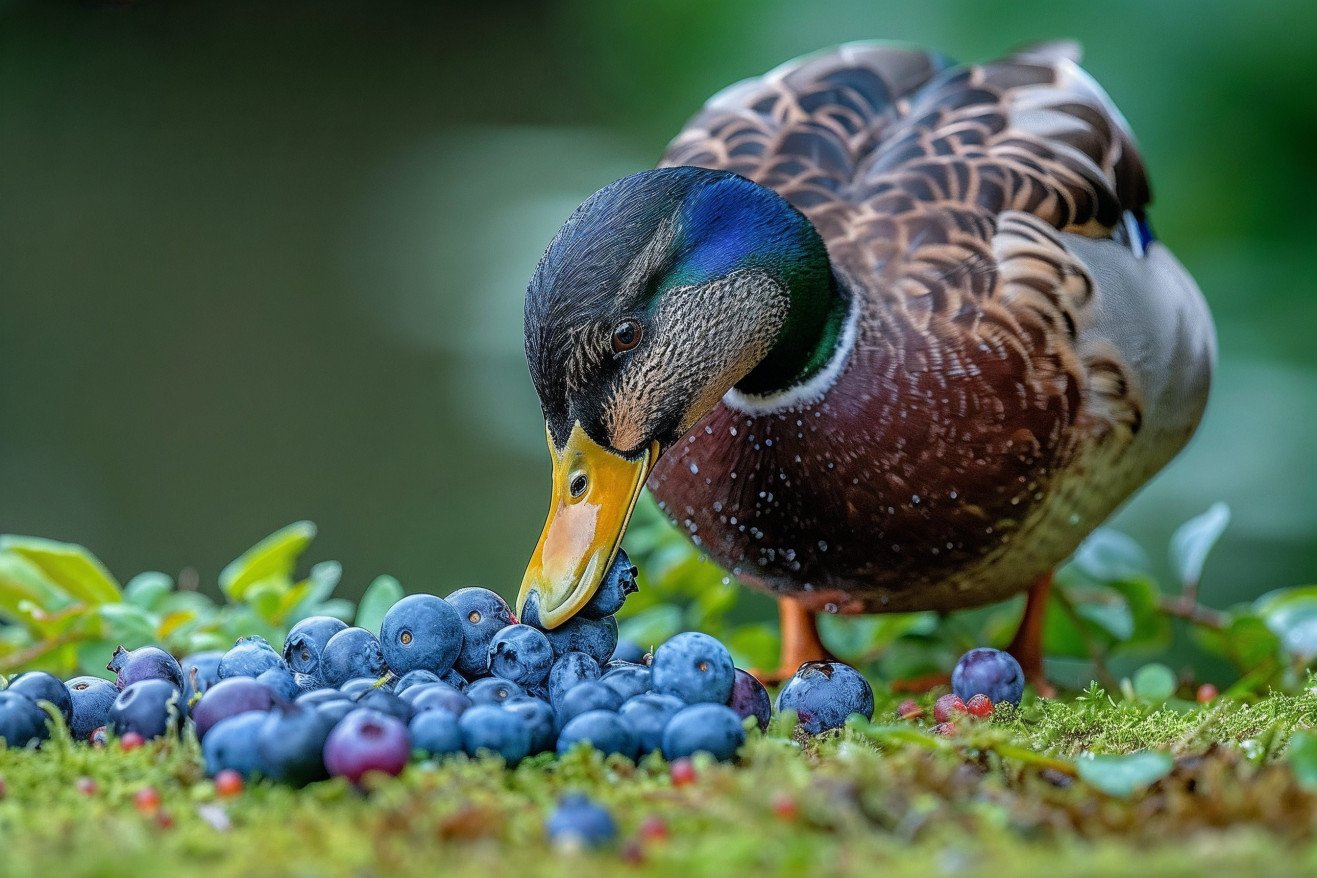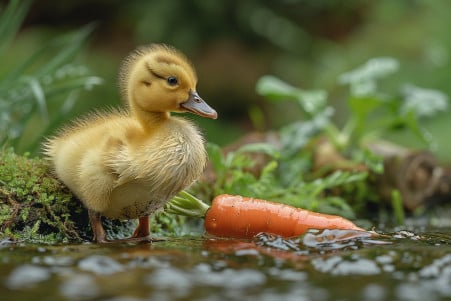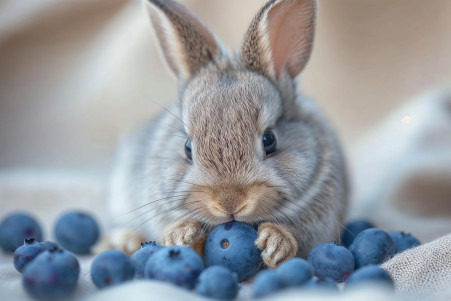Can Ducks Eat Blueberries? Nutritional Benefits & Feeding Tips
15 February 2024 • Updated 14 February 2024

While ducks are generally not picky eaters, you may wonder if they can eat blueberries. The answer is yes, ducks can eat blueberries, and they can benefit from the vitamins and antioxidants they contain. That said, blueberries are high in sugar, so they should be fed to ducks in moderation.
It’s also important to make sure the blueberries you feed them are fresh and free of pesticides. Finally, blueberries should be considered a treat, not a regular part of a duck’s diet.
This article will delve into a variety of nutritional studies, advice from veterinarians, and information from avian professionals to help you better understand where blueberries fit into a duck’s diet.
It will also cover how often and how much you should feed blueberries to ducks to ensure they get the most out of them with the fewest potential downsides.
Finally, it will discuss what feeding ducks fruit in general, and blueberries in particular, means in the larger context of waterfowl care. By the end, you’ll have a better idea of how to feed ducks and know the nutritional benefits of blueberries so you can make sure you’re taking the best care of your feathered friends.
Can ducks eat blueberries?
Nutritional Facts of Blueberries for Ducks
Blueberries are a nutrient-rich snack for ducks and are full of good stuff. They have vitamins like A, C, and K, which are important for the immune system, skin health, and maintaining good feather quality in ducks.
Although ducks can make their own Vitamin C and therefore don’t need it, iAdoreBirds points out that it can still be helpful, especially in times of stress, and may even help with egg production and quality.
Osmosis explains that Vitamin K1 is important for blood clotting, and Vitamin E is important for preventing conditions like wry neck in ducklings, which can impact their bone and muscle growth.
The minerals manganese, copper, and potassium found in blueberries are good for bone health and can help prevent soft-shell eggs, which Pet Keen warns is a common issue.
However, it’s important to make sure ducks don’t eat too many blueberries because they’re high in sugar and water, which can lead to diarrhea. Animals World UK also notes that if ducks eat too many blueberries, it could throw off their balanced diet and natural foraging habits.
Most experts suggest feeding ducks a small portion of blueberries, no more than 2–3 times a week. This way, you can make sure that your ducks get the benefits of blueberries without any potential downsides. Blueberry seeds and leaves are safe for ducks to eat and can also provide some nutritional value. If done correctly, adding blueberries to your duck’s diet can be a great way to help them stay healthy.
How to Create a Balanced Diet That Includes Blueberries for Your Ducks
Of course, it’s important to make sure that your ducks are getting a well-rounded diet, and while blueberries can be a healthy addition to their meals, they should be just that: an addition.
Manna Pro explains that ducks need a diverse diet that includes grains, greens, insects, and aquatic plants to mimic their natural foraging habits. Blueberries can be included in this diverse diet as a way to make sure that they’re getting the vitamins and antioxidants that they need.
Adding blueberries to your ducks’ diet as an occasional treat is easy. Animals World UK says that you can give your ducks a small handful of blueberries a few times a week.
As long as you’re also feeding them a diet of waterfowl pellets or crumbles, grains, and leafy greens, you can make sure that you’re giving them the treats that they want without taking them too far away from their natural foraging habits, which is important for their overall health and happiness.
Ducks of Providence’s bird experts also suggest mixing blueberries in with other treats to make sure that your ducks are getting a variety of snacks without throwing off their diet. Not only does this make sure that your ducks are getting the nutrition that they need, but it also makes sure that they’re staying engaged with their environment, exhibiting natural behaviors, and not becoming too reliant on any one food source.
By following these guidelines, you can enjoy feeding your ducks blueberries while making sure that you’re helping them stay as healthy as possible.
Mindful Feeding: Blueberries & Duck Nutrition Basics
The size and environment of a duck flock will determine the most effective feeding strategies. For example, a study from Cornell University found that herded ducks will require large foraging spaces and constant attention from a herder.
On the other hand, smaller flocks of ducks kept in a backyard setting may need to be given additional feed to ensure that they grow properly and lay eggs regularly. When feeding ducks treats like blueberries, especially young ducks, it’s important to start with small amounts to avoid choking, as noted by Bird Nature.
The Animal Health Diagnostic Center stresses the importance of making sure that ducks have access to clean water and suggests that ducks have access to water for at least 8 to 12 hours a day. Proper food storage is also important, as grains that are not properly dried can grow mold that can be toxic to ducks. To ensure that ducks don’t choke, make sure that you feed them fresh blueberries that have been completely thawed.
It’s also important to make sure that the feeding area is kept clean and that food is stored in a way that doesn’t attract pests that could pose a threat to the ducks or their eggs. Not only will this help ensure the ducks’ health, but it will also help you learn more about what ducks need to eat.
A Closer Look at Duck Digestion: How Blueberries Are Broken Down
A closer look at the duck digestive system can help us understand how ducks process the blueberries we feed them. Ducks don’t have teeth, so they use the flexible bottom of their bill to filter food from the water.
As shown in the Digestive System of the Canvasback Duck, food passes from the esophagus to the crop, a food-storage organ, and then to the proventriculus—a glandular stomach section where digestive enzymes are secreted.
However, the most important part of the digestive system for ducks, especially when it comes to digesting fruit like blueberries, is the gizzard, also known as the ventriculus. The gizzard is a muscular stomach chamber that uses ingested grit to grind food, acting as a biological food processor that’s essential for breaking down the tough plant fibers and seeds that ducks eat.
Ducks can digest the sugars and nutrients in fruit, but the effectiveness of this process is dependent on the gizzard’s muscular contractions, which cause the stones inside it to crush the blueberries, allowing the nutrients to be absorbed.
Ducks Unlimited notes that an understanding of duck digestion is important for proper management, and it’s important to consider the dietary needs and digestive abilities of ducks when feeding them fruit. A healthy gizzard, which is supplied with an adequate amount of grit, allows waterfowl to get the most nutrition from their diet, including the sweet, succulent blueberries we feed them.
Final Thoughts on Feeding Ducks Blueberries
As we have learned, blueberries can be a nutritious and delicious snack for ducks, packed with important vitamins and minerals that can help keep their immune systems strong and their feathers bright. That said, it’s important to feed them in moderation because of their sugar content, so that ducks don’t experience health problems and so that they continue to eat the other nutritious foods they find in their environment.
It’s important to make sure that ducks are healthy, and that means being a responsible feeder, which includes feeding them a balanced diet that includes blueberries in moderation. However, it’s also important to make sure that the other foods that ducks need, like grains, leafy greens, and protein, aren’t being pushed out of their diet by blueberries.
If you want to make sure that you’re feeding your ducks the right things, you should do more research and talk to people who are experts in avian care. Both Ducks of Providence and Pet Keen provide information that’s specific to the dietary needs and living conditions of ducks, which is why it’s important to make sure that you’re getting information from people who are experts in the field.
Taking care of ducks can be rewarding and challenging, but it can also be a way to learn more about the animals and make sure that you’re taking care of their needs. In doing so, you can also learn more about the animals and the world around you.


